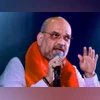Home Minister Amit Shah will preside over the 31st meeting of the Northern Zonal Council in Punjab's Amritsar on September 26, Ministry of Home Affairs (MHA) said on Sunday.
Northern Zonal Council comprises the states of Punjab, Haryana, Rajasthan, Himachal Pradesh and the Union Territories of Delhi, Jammu and Kashmir, Ladakh and Chandigarh.
A wide range of issues including Bhakra-Beas Management Board, affiliation to Punjab University, road construction work under PMGSY, canal projects and water sharing, issues related to the reorganization of states, development of infrastructure, land acquisition, environmental and forest-related clearance, regional connectivity under the UDAN scheme and other issues of common interest at the regional level are to be discussed in the Northern Zonal Council meeting.
Other issues of national importance include operationalisation of Fast Track Special Courts (FSTC) for speedy investigation and speedy disposal of rape cases against women and children, facility of banks/India Post Payment Bank branches within 5 km of each village, creation of two lakh new Primary Agricultural Credit Societies (PACSs) in the country, eliminating malnutrition among children through nutrition campaign, reducing the drop-out rate of school children, participation of government hospitals in Ayushman Bharat Pradhan Mantri Jan ArogyaYojana (AB PM-JAY) as well as other issues of common interest at the national level are also to be discussed in the meeting.
The meeting is being organised by the Inter-State Council Secretariat under the MHA in collaboration with the government of Punjab.
Also Read
The 31st meeting of the Northern Zonal Council will be attended by the chief ministers of the member states along with two senior ministers from each state and the lieutenant governors and administrators of the Union Territories. The chief secretaries and other senior officers of the state governments and Union Territories and senior officers of the Central government will also participate in the meeting.
Five Zonal Councils were established in 1957 under Section 15-22 of the States Reorganization Act, 1956. Union Home Minister is the Chairman of these five Zonal Councils, while the chief ministers of the states and the administrator or lieutenant governor of the Union Territories included in the respective Zonal Council are its members, one of whom is the Vice-Chairman by rotation each year.
Two more ministers from each state are nominated by the governor as members of the council. Each Zonal Council has also constituted a standing committee at the level of chief secretaries.
Noting that Prime Minister Narendra Modi believes that strong states create a strong nation, MHA said the zonal councils provide a platform to enhance cooperation through a systematic mechanism for regular dialogue and discussion on issues affecting two or more states or the Center and the states.
Zonal councils play an advisory role, but over the years these councils have emerged as an important mechanism for promoting mutual understanding and cooperation in various fields.
Over the last nine years, since June 2014, a total of 53 meetings of various zonal councils have been held which includes 29 meetings of standing committees and 24 meetings of zonal councils.
Union Home Minister has promoted the approach of cooperative federalism to empower states and promote better understanding between the Centre and the States on the policy framework, said the MHA, adding "he has advocated using zonal councils to resolve disputes and promote cooperative federalism."
One good practice from each state and the UT selected by the standing committee is also presented by the member states and UTs in every meeting of the zonal councils, it said.
(Only the headline and picture of this report may have been reworked by the Business Standard staff; the rest of the content is auto-generated from a syndicated feed.)

)
